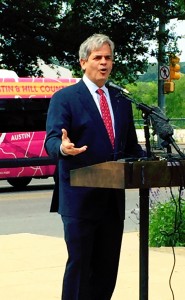I worked to avoid this costly election because neither choice delivers by itself the outcome Austin needs. What Austin needs are safety, TNCs, and local control.
Today, neither Prop 1 choice is best for Austin because neither delivers by itself what we need.
But because these are the only choices in front of me, I will vote “Against” on Prop 1 because I believe such a vote puts Austin and the rideshare companies constructively back at the negotiating table.
I have concluded that only an “Against” vote will allow Austin to find the right solution.
While Uber and Lyft have indicated they might leave Austin if Prop 1 fails, I believe they want to stay and ultimately negotiation is going to be their best option, too.
The vote has been set up so that there is a winner and a loser. I once again reject that forced choice. I believe an “Against” vote on Prop 1 puts us constructively back at the negotiating table.
I am confident that Austin’s reputation as a thoughtful, progressive, enormously capable city is secure. After the election is over, we’ll need to be at our most innovative, creative and collaborative to simultaneously keep Uber and Lyft in town, keep Austin local, and best provide for material public safety choices.
Oh and one more thing, because these issues are now related…
As you may have read already, the US National Chamber of Commerce last week tried to tie Prop 1’s outcome to our well-publicized Smart Cities Mobility Challenge proposal, suggesting that a defeat of Prop 1 ought perhaps disqualify us, or at least reduce our chances.
I can’t disagree more with the US National Chamber’s message, and their tactic. The great irony is that I was traveling with the Secretary of Transportation Anthony Foxx (a former Mayor of Charlotte, North Carolina) all of last week speaking in three countries about how Austin is an international leader in innovation.
 The Secretary’s mobility challenge deals not only with new technologies, but also with finding the right compact between government and business on issues such as Open Data (resisting private ownership), avoidance of proprietary systems (that lock users to one provider), standardization (so that governments and companies work together to the same end), and, I believe, with finding the right place for government to support the new sharing peer-to-peer economy without abdicating its public safety responsibility.
The Secretary’s mobility challenge deals not only with new technologies, but also with finding the right compact between government and business on issues such as Open Data (resisting private ownership), avoidance of proprietary systems (that lock users to one provider), standardization (so that governments and companies work together to the same end), and, I believe, with finding the right place for government to support the new sharing peer-to-peer economy without abdicating its public safety responsibility.
The US Chamber of Commerce suggests that an “Against” vote would demonstrate that Austin is not an innovative and forward-looking community. The exact opposite is true.
There’s a reason Austin is number one in Texas in start-ups, venture capital and patents.
There’s a reason tech and transportation companies come to Austin to roll out their innovations.
And that’s because Austin is where good ideas become real.
In fact, not only would I put our city’s ability to innovate up against any other city in the country, that’s exactly what we’re doing as a finalist city for the Smart City Challenge.
Claiming that Austin is anti-innovation has no basis in fact. Innovation is in our DNA, and if the US Chamber of Commerce were really interested in creating jobs, they should study how we do things in Austin. We have been and will be innovative in providing equality and access in our city.
We want to win the Smart Cities Challenge, but at the end of the day our future is not dependent on whether we win. We’re going to execute our plan whether we win or not. Nothing will deter or derail us in addressing one of Austin’s most pressing issues. We are not asking the federal government for permission. We’re asking them to accelerate our vision.
Regardless of what happens on May 7, we must work together to achieve a robust, safe and locally responsive rideshare system.
It’s going to require that all parties brush off past indignities and dedicate ourselves afresh to a solution that works for everyone. I am today as eager and as resolved as ever to do just that. Austin is an innovative city at the cutting edge and I believe we can get this done.

One comment
Comments are closed.